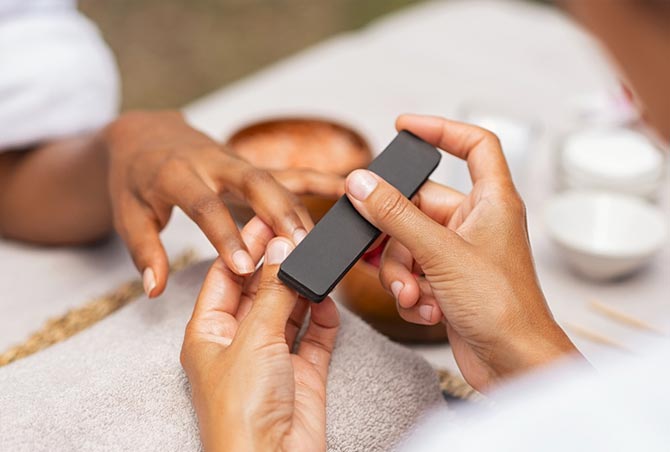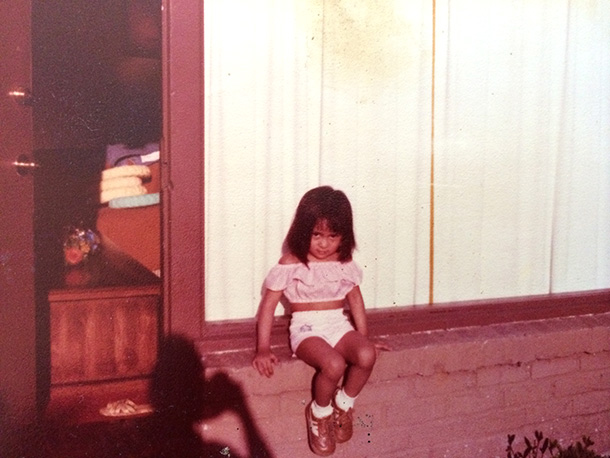
Reading: 3 minutes
Natural, smooth, and well-groomed nails is a minimalist look that may not get you quite as many compliments as acrylics, but it does give your nails a well-deserved break. Giving them time to recover and restore their natural beauty is a must-do every now and then, no matter if you usually have them done or not.
But nail care goes beyond the plate and the fold — an important but often neglected part is the cuticle. This thin, delicate strip of skin is critical to the overall health of your nails and deserves its share of love and attention. Let’s explore the best ways to nourish and protect your cuticles.
What are cuticles?
You may think the cuticle is the skin surrounding your entire nail, but it’s actually just a small part known as the eponychium. It’s that clear layer of skin you see at the bottom of your nail. This small but mighty area is crucial for protecting your nails from bacteria and keeping them hydrated as they grow.
If your cuticles are damaged, your nails are more susceptible to infection. Plus, strong, smooth nails look their best when paired with healthy-looking cuticles. Knowing how to take care of them is the key to a perfect manicure.
Caring for your cuticles: what not to do
Resist the urge to cut them
While you may be tempted to trim your cuticles at home to make them look neater, it’s usually not a good idea. Cutting your cuticles can cause irritation and even expose your nails to potential infections. Avoid the risk of infection and leave all cuticle trimming to the skilled hands of a nail care professional.
Avoid harsh products that can dry them out
Your cuticles are skin. Just like the skin on any other part of your body, they can dry out — sometimes more easily! As the area is extremely delicate, dry cuticles can easily lead to peeling or flaking.
Because cracked cuticles can make your nails more susceptible to infection, avoid products or habits that can dry out your skin. This includes washing dishes without gloves, using harsh nail polish removers, or washing your hands too vigorously. Just remember to treat your hands (and cuticles) with kindness and care.
No biting!
Biting your nails or the skin around your fingers is a common nervous habit, and this includes nibbling on your cuticles. However, doing this not only invites bacteria in, but also increases the risk of infection.
Breaking these habits can be difficult, but remember, the power to change is in your hands (literally). If you’re struggling, talk to your dermatologist. They can offer personalized advice and strategies to help you break these bad habits.
Caring for your cuticles: what you should do
Keep them well hydrated
To keep your nails looking healthy and strong, it’s important to keep the entire area well hydrated, including the cuticles. Incorporating regular moisturizing into your nail care routine can significantly reduce the likelihood of dryness.
For at-home nail care, consider using specific nail strengtheners, cuticle oils and creams. Choosing a product that treats your nails and cuticles is a convenient and effective way to ensure that both are getting the hydration they need. Hyaluronic acid is an excellent choice here!
Cationic hyaluronic acid is absorbed 17 times more effectively than ”regular” hyaluronic acid. This makes nail strengthening treatments enriched with cationic hyaluronic acid a game-changer to help repair your nails and improve their appearance. These are some of its benefits:
✔️ It deeply hydrates both nails and cuticles, improving their appearance and restoring their natural allure.
✔️ Increases flexibility, reducing the risk of breakage.
✔️ When combined with other key ingredients like keratin and silicon, it helps make nails stronger.
Invest in a professional manicure
Pushing back cuticles can create the illusion of longer nails, but doing it yourself may not be the best idea. It’s always safer and more effective to let a trained nail technician do the job for you. If you’re determined to do your cuticles at home, it’s wise to get tips from a professional on the best and safest DIY techniques.
There are two main reasons to leave this task to the professionals. First, it’s important to use the right tools. Second, pushing your cuticles back too far or too often can be painful. Using the wrong methods can also irritate your cuticles, causing them to swell. It’s best to have this procedure done by a skilled professional who provides all of the below:
A clean, hygienic workspace.
Fresh, non-porous tools like files and buffers that prevent bacterial build-up.
Sterilized, professional quality clippers and metal files.
And, most importantly, gentle treatment of your cuticles, nails, and hands — getting your nails and cuticles done should never be a painful experience.
The takeaway? Make a habit of regularly hydrating your cuticles, avoid things that can dry them out, and don’t hesitate to consult a nail care expert when needed. Follow these simple guidelines and you’ll be on your way to strong, healthy nails and impeccable cuticles.
Rating: 5.0/5. From 1 vote.
You voted 5, 3 years ago.
Please wait…
Editorial Team
Our namesake embodies the spirit of embracing life and all its wonder. As wellness journalists, we explore topics that invigorate the senses and keep curiosity alive. We believe that glowing skin is the result of a healthy body and mind. Weaving beauty with science, we aim to inspire you to live young at every age.






